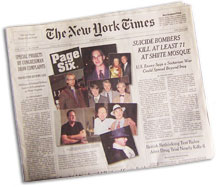 As anyone attuned to sleaze and sensationalism is aware, the scandalmongers at the New York Post’s Page Six are themselves engulfed in a scandal of tsunami-like proportions — at least in the world where reality is defined by People, Us, Star, and the National Enquirer.
As anyone attuned to sleaze and sensationalism is aware, the scandalmongers at the New York Post’s Page Six are themselves engulfed in a scandal of tsunami-like proportions — at least in the world where reality is defined by People, Us, Star, and the National Enquirer.
The Post’s Gotham-tabloid rival, the Daily News, is having predictable sport with the story. And the good, gray New York Times has also pulled out all the stops. As the Wall Street Journal rather archly noted on Tuesday, the Times had so far published more words on this subject (10,865) than even the News (6588).
It tells us something about the central place of gossip in our national life when the self-proclaimed paper of record dedicates this much real estate to such a story. But when you look at how the Times reported the story, framed the issues, and internalized the central points the story’s leakers clearly had in mind, you realize that the Times isn’t exercising the independent judgment one expects from a paper with its history and pretensions.
There is a story here, but it’s about media ethics, not the federal crime of extortion. Because federal prosecutors are involved, the Times is treating this as a criminal case. It’s not. Rather, the Times has adopted the mind-set of federal prosecutors and the “victim’s” legal team: if it’s ugly, it can be twisted and spun to appear to fit the definition of some federal crime.
Naughty boy
New York Post gossip writer Jared Paul Stern became fodder for national gossip himself last Saturday when the New York Times (the Daily News was off and running with the story the day before) ran a sensationalized story about him on page one, above the fold, consuming one-third of the page and complete with a scandal-sheet-style photographic montage of the major players. This was followed by another page-one story, on Sunday, accompanied by a grainy surreptitious-surveillance video frame.
What exactly did Stern do? According to news reports, a private-investigative firm hired by supermarket magnate Ron Burkle captured Stern on secretly recorded video in Burkle’s TriBeCa loft. On the tape, Stern appears to be asking for a $100,000 initial payment plus $10,000 a month, ominously described by the Times as a “monthly stipend ... in return for keeping negative information about [Burkle] out of the [Post].” Burkle, 53, had earlier claimed in letters to the Post that embarrassing Page Six stories describing him as a “party-boy billionaire” who dated supermodel Gisele Bundchen, among other women, and went through an ugly breakup were false. So he arranged to meet Stern at a Manhattan hotel last summer, “after a friend suggested Mr. Stern could give him some insight into Page Six.” At that meeting, Burkle alleges, Stern asked him to become a source for Stern’s gossip pieces. Burkle reportedly declined, but agreed to buy 60 shirts from Stern’s clothing line “as a favor.” Burkle’s lawyer, Martin D. Singer, then lodged a number of litigation threats against the paper, all to no avail. However, the story goes on, “an employee of Mr. Burkle’s received an e-mail message from Mr. Stern, a contributor who worked two days a week for Page Six, suggesting that Mr. Burkle could change the column’s treatment of him.”
The text of the e-mail is crucial to understanding what transpired between Stern and Burkle. “I understand Ron is upset about the press he’s been getting,” the e-mail states. “If he’s really concerned, he needs a strategy for dealing with it and regulating it rather than merely reacting. It’s not easy to accomplish, but he certainly has the means to do so.” It was at this point, the Times reports, that Burkle “suspected he was being extorted” and “reached out to his attorney, who then reached out to law enforcement.” What followed was right out of the FBI/DOJ playbook: Stern agreed to meet Burkle at least twice in late March at Burkle’s loft, where Burkle’s security team — including a private-investigations firm — recorded that and a subsequent meeting at which a federal agent and a prosecutor joined Burkle’s security detail “to monitor the recording.”
As told by the Times, Stern’s story reads like a fairly cut-and-dried case of blackmail — a crime in every state — but also a federal offense of “extortion,” when any facilities of interstate communications — mail, telephone, e-mail, and the like — are used in an attempt to coerce someone into doing something that he or she does not want to do. Lawyers for high-profile “victims” who report such attempts to the authorities frequently bring in the feds, in part because the federal definition of “extortion,” like many federal crimes, is notoriously broad and loose, so that a wide variety of conduct, much of it lawful though not very nice, can be spun as criminal.